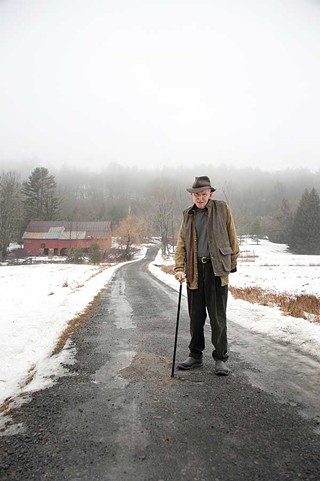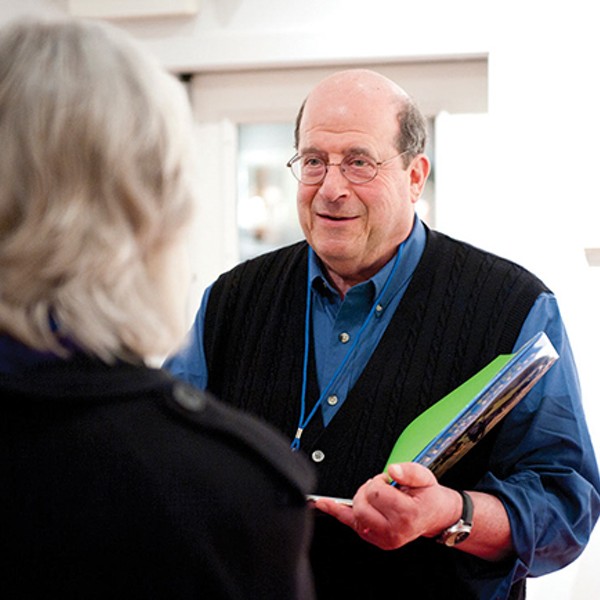358. To make a perfect sentence is a hard day's work.
Michael Perkins has put in a lot of hard workdays. His new book, Life Sentences: Aphorisms & Reflections (Bushwhack Books, 2012) includes 500 deft observations, as polished as stones in a creekbed.
The aphorist lives in a sage-green house at the foot of a mountain in Glenford outside the village of Woodstock. His driveway is lined with bare winter lilacs and filled with snow. Perkins doesn't drive.
484. We don't drive cars; they drive us.
For decades, neighbors have watched his gaunt figure traversing Ohayo Mountain Road's steep switchbacks on the three-and-a-half-mile walk to Woodstock. When Perkins and fellow poet/hiker Will Nixon published Walking Woodstock: Journeys Into the Heart of America's Most Famous Small Town (Bushwhack, 2009), an event flyer featured a photo of Giacometti's elongated Walking Man sculpture, captioned "Do You Know This Man? You've Seen Him on Woodstock Roads."
Walking Woodstock was Golden Notebook's bestselling paperback that year, abetted by Carol Zaloom's gorgeous cover and a "foot-stomping launch party" with local musicians. In his introduction, Perkins opined, "Taking a walk is a declaration of independence, like unhooking from the grid, or shooting your television, as that desert walker Edward Abbey once did. Walking is subversive."
308. Walk in the sun, walk in shadow; walk in all weathers, walk to work, walk to play, walk to get somewhere, walk to leave there. Walk until you fall down. Get up and stagger on.
Perkins brings the same dogged persistence to his literary peregrinations, having published some 40 books. "I've written in almost every genre," he says with some pride. Born in Portsmouth, Ohio, where he "grew up like Huck Finn" on the banks of the river his parents had crossed from Kentucky, he started sending out poems in his early teens; editor Irving Rosenthal encouraged his promise.
At 14, Perkins was diagnosed with nephritis and told had three years to live. "It turned out not to be true," he says. "But it gave me a kick in the pants. I grew up fast. Had to. I didn't want to miss anything."
78. When the odds are overwhelmingly against you, yield, but never surrender.
He married at 17, sped through college, and moved to New York at 20 with his artist wife and young daughter. "I hit the ground running," he says. He wrote for the Village Voice and New York Times Book Review, hanging out with such literary notables as Andrei Codrescu, Janine Pommy Vega, and Samuel R. Delany while renting a series of Lower East Side apartments. His one-act play "Death of the King of Harlem" premiered in Greenwich Village in 1966, and he soon became an editor at Tompkins Square Press.
Shortly after their second daughter was born, Perkins's wife took her own life. He was 25 and a widower, raising two daughters. "I got other people to help," he says, but the girls traveled with him. "They were dancing on tables in Madrid." When he was hired to write a screenplay for Cannon Films, they spent a year in Europe, traveling to London, Spain, Italy, Tangiers, Greece, Scandinavia, and Paris.
Next came two years in Brooklyn, where Perkins wrote the memoir Double Dealer. "My best book, and it's never been published," he says ruefully. He moved to Woodstock in 1972, joining a woman he'd met. "We lived in the slums of Woodstock," he deadpans. "We loved it. It was the country. After Brooklyn, a pure delight." Three years later, he bought the house in Glenford and joined the volunteer fire company.
431. Ethics simplified: what we owe to others is the best of ourselves.
Community work is essential to Perkins, who's also maintained trails for the Appalachian Mountain Club, organized the Woodstock Bicentennial, and spent 10 years as Program Director of the Byrdcliffe Guild (he's married to former Guild director Sondra Howell). But his most enduring contribution may be the Woodstock Library Forum, now in its 27th year. Three Saturdays a month, Perkins offers a lively mix of political speakers and literary events; he estimates that he's presented over a thousand writers.
83. Poetry should be pursued for its own sake, as a private spiritual practice.
Throughout, Perkins was writing, for love and for hire. "I've been a professional writer for almost 50 years," he reflects. "It filled me because I had the drive. A lot of people want to be writers; they don't want to write. If you don't love the process, it won't last."
He writes seven days a week, rising at 6am to work three or four hours. Writing, he says, is its own reward. "If I've got one reader, it's a miracle. If I've got two, it's a groundswell. If I've got three, it's a mass movement."
154. I wear many hats, but they're all cocked at an angle.
With a family to support, Perkins interspersed his own work with assignments. By his reckoning, he's published over a million words of journalism, including criticism in The Nation, American Book Review, Mother Jones, and a long-running stint as book editor of a libidinous underground magazine. "I had a page to myself for 30 years," he reports. "I wrote about classic literature, great novels, Philip Roth." More than 100 of these columns are collected in his 1994 book The Good Parts: An Uncensored Guide to Literary Sexuality (RK, 1994); authors discussed include John Updike, Jerzy Kosinski, John Hawkes, Anais Nin, Mark Twain, and Honey Bruce. From the introduction: "Focusing on Eros is one of the many ways to focus on life, and because this perspective is usually forbidden, perhaps the sweetest."
89. Blessed to be here in this body of incarnate delight, this cloud of consummate bliss, inside this lightly perspiring golden skin.
Perkins's other books include The Secret Record: Modern Erotic Literature (William Morrow, 1976), alongside science fiction, steamy paperbacks, novelizations of movies, a ghost-written memoir for Melvin Van Peebles, and a second collaboration with Nixon, The Pocket Guide to Woodstock (Bushwhack, 2012).
"Michael is one of a rapidly dwindling breed, the kind of writer who used to be referred to as a 'man of letters,'" says poet Mikhail Horowitz, a friend of several decades. "The practice of reading and writing informs his entire life, and he's equally adept at writing poems, essays, novels, erotica, art and literary criticism, even guide books. Each wrinkle and crease in his beloved Catskills landscape summons up a literary allusion; hiking, for him, is above all else an act of reading."
A self-described "neo-Luddite," Perkins eschews e-mail and only started using an iPad in recent months, when he lost too much use of his hands to work on a manual typewriter. "I hate it, but I Google," he admits. But he misses the percussion and permanence of typewritten text. "You feel like a craftsperson, like you're making something. You're banging the letters right into the paper."
He asserts that the discipline of retyping a manuscript leads to more rigorous editing. "If you use a word processor, you get processed words. It's too easy. I'd rather retype it again and again and again. But now I can't." He shrugs.
137. Having a neurological disease like Parkinson's is like dancing each day with a new and sadistically energetic partner who has two left feet.
Perkins was diagnosed with Parkinson's disease 10 years ago, and it gives his limbs a gnarled, restless energy; he's never still. "If you're unlucky enough to get any disease, cancer or anything else, people don't know what to do with you," he says. "You're like a wounded bird—they avoid you, or overcompensate with sympathy. Treat the afflicted like you would anyone else. If they ask for help, give it. Other than that, ignore it."
"I think we're all handicapped in one way or another," he adds, noting that living with Parkinson's "makes me more appreciative of what I have, more able to see the world the way it should be. We're all in this together."
This seems a very different worldview than his frequently mordant Life Sentences:
4. Two-and-a-half-million years of humanity, and then the Industrial Revolution; in two hundred years, planetary disaster.
117. Mankind is nature's original sin.
162. Tattoos: maps to a missing soul.
146. The blank page will not fail me.
Perkins spent three or four years gathering aphorisms for the book. Eventually he typed all 500 on cards, spreading them out to arrange them thematically, a process he likens to ordering a volume of poetry (he's published four, most recently Carpe Diem: New and Selected Poems; 2011, Bushwhack). Though both forms encourage succinctness, "A poem has to have rhythm and melody. An aphorism gets right to the point," Perkins says.
He's currently writing a second collection, some of which are displayed on his refrigerator with magnets shaped like glittering cockroaches. Also in progress: Bartleby Crump, a children's book—"A genre I haven't tried yet!"—about two 11-year-olds who want to become adults, and another collection of poems.
390. Everything is astonishing. If it doesn't seem that way, keep looking until it does.
You might want to start by watching a man walk uphill. Better yet, drop your car keys and join him.
This month at the Woodstock Library Forum: Michael Perkins presents novelists Tad Richards and Derek Furr (2/2), filmmaker Cambiz Khosravi (2/9), and the creator of "Alan's Italy" (2/16). All events at 5pm; free admission and refreshments.

















